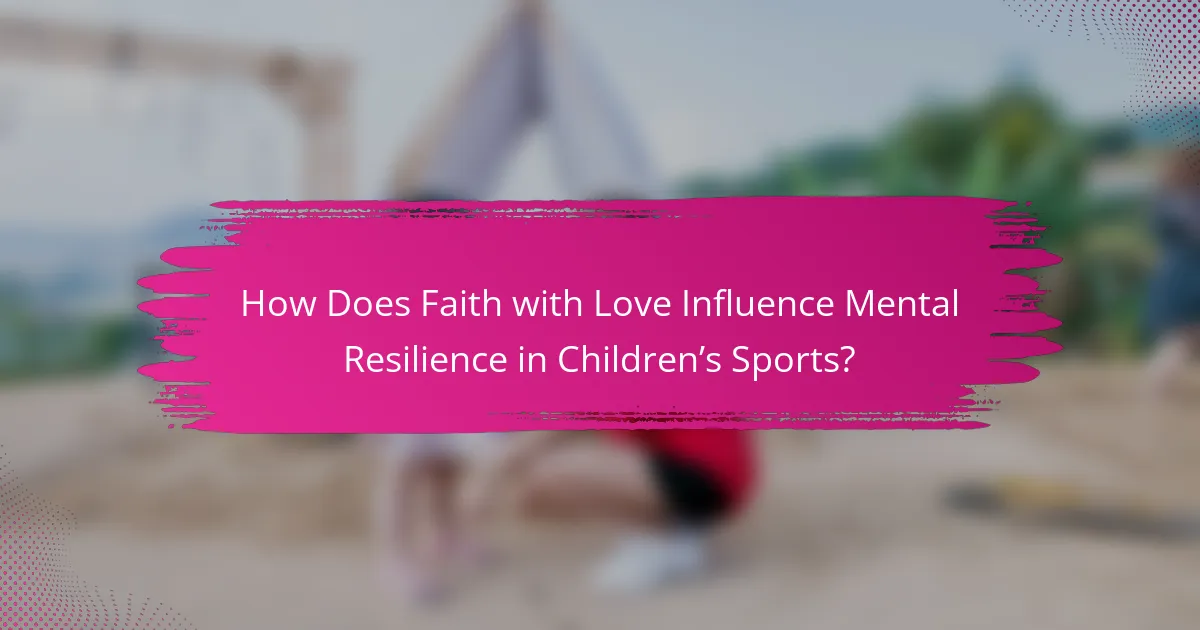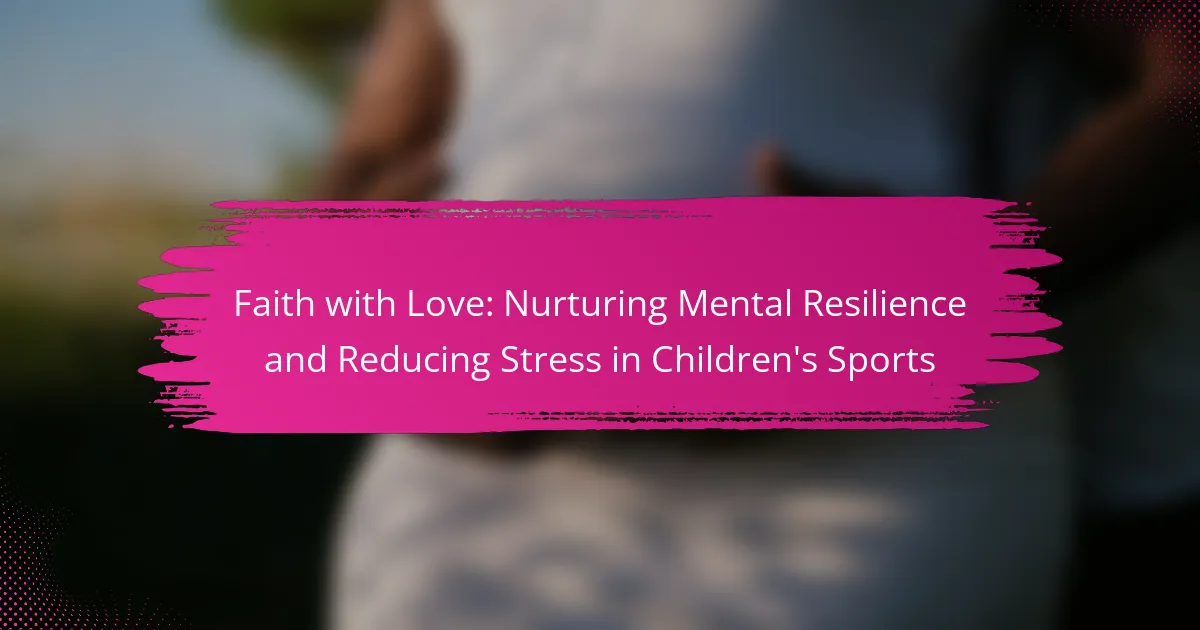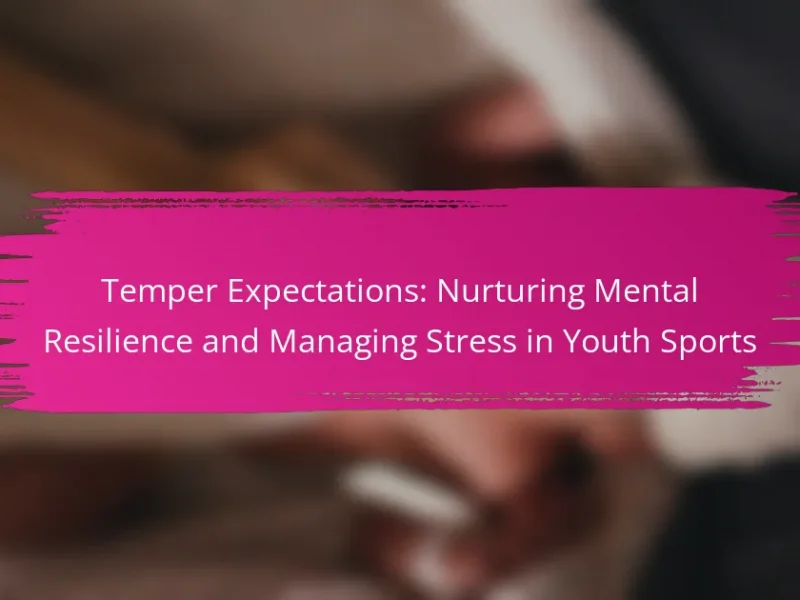Nurturing mental resilience and reducing stress in children’s sports is essential for their overall well-being and performance. Faith with love creates a supportive environment that enhances coping strategies. Young athletes face stressors like performance pressure and parental expectations, which can lead to anxiety. Implementing strategies such as promoting a growth mindset and fostering open communication can significantly improve their mental resilience.

How Does Faith with Love Influence Mental Resilience in Children’s Sports?
Faith with love significantly enhances mental resilience in children’s sports by fostering a supportive environment. This nurturing atmosphere helps children manage stress effectively. Research indicates that children who experience unconditional love and encouragement demonstrate improved coping strategies during competitive situations. As a result, they are more likely to maintain focus and motivation. Additionally, faith instills a sense of purpose, empowering children to overcome challenges and setbacks. Through these combined influences, mental resilience is strengthened, leading to better performance and overall well-being in sports.
What Are the Key Components of Mental Resilience in Young Athletes?
Key components of mental resilience in young athletes include emotional regulation, social support, goal setting, and positive self-talk. Emotional regulation allows athletes to manage stress and anxiety effectively. Social support from coaches and peers fosters a sense of belonging and encouragement. Goal setting provides direction and motivation, enhancing focus during training and competition. Positive self-talk reinforces confidence and combats negative thoughts. Together, these elements nurture mental resilience, helping young athletes thrive in sports.
How Can Coaches Foster a Supportive Environment for Mental Development?
Coaches can foster a supportive environment for mental development by emphasizing emotional safety and open communication. Creating this atmosphere encourages children to express feelings and challenges without fear of judgment.
Incorporating team-building activities strengthens bonds among players, enhancing trust and collaboration. Regular check-ins allow coaches to gauge mental well-being, addressing issues proactively.
Training sessions should include mindfulness practices, which promote mental resilience and stress reduction. This unique approach equips children with tools to manage pressure effectively, improving their overall performance.
Recognizing individual strengths fosters a sense of belonging and boosts self-esteem. Tailoring feedback to each child’s needs ensures they feel valued and supported in their mental growth.
What Techniques Can Coaches Use to Promote Positive Mindsets?
Coaches can promote positive mindsets by fostering a supportive environment and encouraging open communication. Techniques include setting achievable goals, using positive reinforcement, and teaching mindfulness practices. These methods enhance children’s mental resilience and reduce stress in sports.
How Does Communication Impact Children’s Emotional Well-being?
Effective communication significantly enhances children’s emotional well-being by fostering a supportive environment. Open dialogue encourages emotional expression, helping children process feelings. Studies show that children with strong communication skills exhibit lower stress levels and improved resilience. Furthermore, nurturing communication within sports settings promotes teamwork and builds confidence, essential for mental health.

What Are the Common Stressors Faced by Young Athletes?
Young athletes commonly face stressors such as performance pressure, parental expectations, and balancing academics with sports. These factors can lead to anxiety and burnout, impacting their mental resilience. Performance pressure arises from competition and self-imposed standards, while parental expectations can create additional stress. Balancing academics and sports often leads to time management issues, affecting overall well-being. Addressing these stressors is crucial for nurturing mental resilience in young athletes.
How Do Competitive Pressures Affect Mental Health in Youth Sports?
Competitive pressures can negatively impact mental health in youth sports by increasing stress and anxiety levels. These pressures often stem from high expectations, intense competition, and the desire for parental approval. As a result, young athletes may experience burnout, depression, and diminished enjoyment of sports.
Nurturing mental resilience is essential. Programs that focus on emotional support, skill development, and fostering a love for the game can mitigate the adverse effects of competition. Encouraging a healthy balance between performance and personal growth helps maintain children’s mental well-being.
Research indicates that supportive coaching and positive reinforcement significantly contribute to a child’s mental health in sports. Coaches should prioritize mental health alongside athletic performance to create a more balanced environment.
Ultimately, fostering a culture of love and support in youth sports can reduce stress and enhance resilience, allowing children to thrive both on and off the field.
What Role Does Parental Expectation Play in Stress Levels?
Parental expectations significantly influence children’s stress levels in sports. High expectations can lead to increased pressure, which may result in anxiety and decreased performance. Research indicates that children with supportive parents who set realistic goals experience lower stress and enhanced enjoyment in sports activities.

What Unique Strategies Can Be Implemented to Reduce Stress?
To reduce stress in children’s sports, implement unique strategies that foster mental resilience through faith and love. Encourage positive reinforcement, create a supportive environment, and emphasize teamwork.
1. Promote a growth mindset by celebrating effort over results.
2. Incorporate mindfulness practices to enhance focus and emotional regulation.
3. Facilitate open communication to address concerns and build trust.
4. Organize team-building activities that strengthen relationships and camaraderie.
5. Involve parents in supportive roles to reinforce a positive atmosphere.
6. Use visualization techniques to help children manage anxiety before competitions.
How Can Mindfulness Practices Be Integrated into Training?
Mindfulness practices can be effectively integrated into training by incorporating short, focused sessions that cultivate awareness and presence. These practices enhance mental resilience and reduce stress in young athletes. Techniques such as deep breathing, visualization, and mindful movement can be seamlessly woven into warm-ups or cool-downs. Regular practice fosters a supportive environment, allowing children to build emotional regulation and focus. As a result, athletes demonstrate improved performance and enjoyment in their sports activities.
What Are the Benefits of Team-Building Activities for Stress Relief?
Team-building activities enhance stress relief by fostering connection, improving communication, and building trust among participants. These activities create a supportive environment where children learn to manage stress collectively. Engaging in collaborative tasks promotes resilience, allowing young athletes to face challenges with confidence. Regular participation in team-building can significantly lower anxiety levels, leading to better performance in sports.
How Can Visualization Techniques Enhance Performance and Reduce Anxiety?
Visualization techniques can significantly enhance performance and reduce anxiety in children’s sports by fostering mental resilience. These techniques allow young athletes to mentally rehearse successful outcomes, improving focus and confidence. Research indicates that visualization can lead to a 45% increase in performance metrics when practiced regularly. By creating a clear mental image of their goals, children can better manage stress and anxiety during competitions. This method not only boosts their performance but also cultivates a positive mindset, essential for long-term success in sports.

What Rare Attributes Contribute to Effective Stress Management?
Faith and love foster unique attributes that enhance stress management in children’s sports. These attributes include emotional support, community belonging, and purpose-driven engagement. Emotional support from caregivers and coaches builds trust, enabling children to cope with stress effectively. Community belonging creates a safe environment, reducing anxiety and promoting resilience. Purpose-driven engagement instills motivation, helping children navigate challenges with confidence. Together, these rare attributes contribute significantly to nurturing mental resilience and reducing stress in young athletes.
How Can Emotional Intelligence Training Benefit Young Athletes?
Emotional intelligence training benefits young athletes by enhancing their mental resilience and reducing stress. This training fosters self-awareness, allowing athletes to manage their emotions effectively during competition.
Additionally, it promotes empathy, improving communication and teamwork skills. Research indicates that athletes with higher emotional intelligence experience less anxiety and perform better under pressure.
By nurturing these skills, young athletes can develop a healthier relationship with sports, increasing enjoyment and long-term participation.
What Innovative Approaches Are Being Used to Support Mental Health?
Innovative approaches to support mental health in children’s sports include integrating emotional intelligence training, fostering supportive team environments, and promoting mindfulness practices. These strategies help nurture resilience and reduce stress. Programs focusing on emotional awareness have shown to enhance performance and well-being, leading to improved mental health outcomes. Additionally, incorporating parental involvement creates a holistic support system, further reinforcing children’s mental resilience.

What Best Practices Can Parents Adopt to Support Their Children?
Parents can adopt practices that foster mental resilience and reduce stress in their children’s sports activities. Encouraging a balanced approach to competition and emphasizing enjoyment over winning can significantly impact children’s experiences.
Establishing open communication allows children to express their feelings and concerns. This connection helps parents identify stressors and provide support. Additionally, modeling positive coping strategies, such as mindfulness and relaxation techniques, equips children with tools to manage anxiety during sports.
Setting realistic expectations is crucial. Parents should focus on effort and improvement rather than solely on outcomes. This unique attribute nurtures a growth mindset, promoting resilience in the face of challenges. Lastly, creating a supportive environment, whether through team involvement or family participation, can reinforce a sense of belonging and reduce performance pressure.
How Can Parents Encourage a Healthy Balance Between Sports and Life?
Parents can encourage a healthy balance between sports and life by fostering mental resilience and reducing stress in their children. Prioritize open communication to understand children’s feelings about sports. Set realistic expectations to alleviate pressure, allowing kids to enjoy their activities. Encourage breaks and downtime to promote overall well-being. Support diverse interests beyond sports, helping children develop a well-rounded identity. Engage in family activities that reinforce love and support, creating a nurturing environment.
What Common Mistakes Should Parents Avoid When Supporting Young Athletes?
Parents should avoid overemphasizing winning, pressuring children excessively, and neglecting mental well-being. These mistakes can hinder young athletes’ development and enjoyment of sports.
Focusing solely on performance can lead to stress and burnout. Instead, encourage effort and improvement. Supporting a balanced approach fosters resilience and a positive experience in sports.
Additionally, avoid comparing children to peers. Each athlete develops at their own pace. Highlight their unique strengths to build confidence.
Lastly, ensure open communication. Listen to children’s feelings and concerns about sports. This nurtures trust and mental resilience, essential for their overall growth.
How Can Parents Collaborate with Coaches to Enhance Mental Resilience?
Parents can enhance mental resilience in children by collaborating closely with coaches. Open communication fosters a supportive environment. Regular meetings can align coaching methods with parental support strategies. Sharing insights on children’s emotional responses helps create tailored approaches. Encouraging positive reinforcement from both parents and coaches builds confidence. Jointly setting realistic goals promotes a sense of achievement and reduces stress.
What Expert Insights Can Help Parents and Coaches Foster Mental Development?
Expert insights emphasize the importance of fostering mental resilience in children through supportive environments. Parents and coaches should prioritize emotional intelligence, encouraging open communication and understanding. Practicing mindfulness techniques can significantly reduce stress, enhancing focus during sports activities. Additionally, setting realistic expectations helps children build confidence, promoting a healthier sports experience. Regular feedback and positive reinforcement nurture a growth mindset, essential for mental development.


